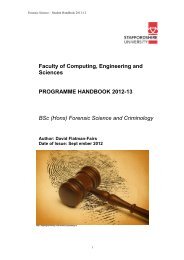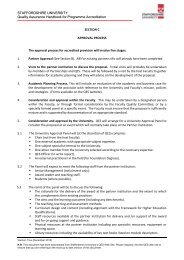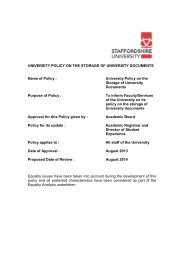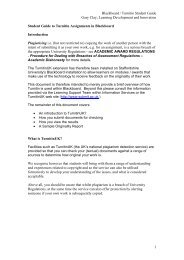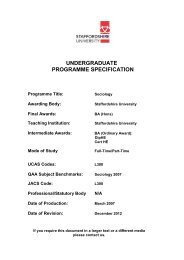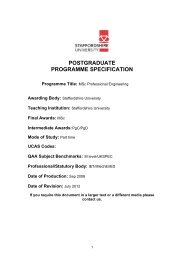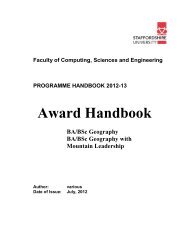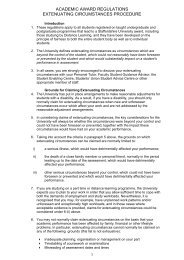Software Engineering Programme Specification - Staffordshire ...
Software Engineering Programme Specification - Staffordshire ...
Software Engineering Programme Specification - Staffordshire ...
You also want an ePaper? Increase the reach of your titles
YUMPU automatically turns print PDFs into web optimized ePapers that Google loves.
<strong>Programme</strong> outcomes<br />
At the end of your studies you should be able to:<br />
Knowledge & Understanding<br />
Demonstrate a systematic understanding of computing concepts and principles.<br />
Show that you have acquired coherent and detailed knowledge about the principles<br />
and practices of <strong>Software</strong> <strong>Engineering</strong>, some of which is at, or informed by, the<br />
forefront of research and development in <strong>Software</strong> <strong>Engineering</strong>.<br />
Learning<br />
Develop lines of argument and evaluate possible approaches, tools, techniques,<br />
platforms and solutions based on knowledge of <strong>Software</strong> <strong>Engineering</strong> principles and<br />
practices, and demonstrate understanding of the uncertainty, ambiguity and<br />
limitations of this knowledge.<br />
Enquiry<br />
Initiate and carry out <strong>Software</strong> <strong>Engineering</strong> projects.<br />
Ethically gather information pertaining to computing problems, possible solutions,<br />
and the success of these solutions, from existing or potential users and/or<br />
organisations using established <strong>Software</strong> <strong>Engineering</strong> practices.<br />
Find, critically evaluate, manage, apply, and understand information from a range of<br />
sources, acknowledging the cultural, ethical, economic, legal, and social issues<br />
surrounding the use of such information.<br />
Analysis<br />
Critically discuss current research in <strong>Software</strong> <strong>Engineering</strong>, and evaluate arguments,<br />
assumptions, abstract concepts and data (that may be incomplete) to draw<br />
conclusions.<br />
Problem Solving<br />
Apply knowledge & understanding, learning, enquiry and analysis to devise and<br />
address appropriate questions and strategies that lead to the identification,<br />
development and evaluation of solutions to computing-based problems.<br />
Plan and carry out a large and complex computing project, applying established<br />
<strong>Software</strong> <strong>Engineering</strong> principles and practices.<br />
Communication<br />
Communicate ideas, problems and solutions to both specialist and non-specialist<br />
audiences in a variety of forms, including, but not limited to: written academic reports;<br />
verbal presentations; documentation in support of the development of software;<br />
project management documentation.<br />
Application<br />
Apply <strong>Software</strong> <strong>Engineering</strong> principles and practices and established management<br />
techniques, including those at the forefront of <strong>Software</strong> <strong>Engineering</strong> knowledge, to<br />
the process of developing complex software.<br />
Reflection<br />
Critically evaluate your performance as an academic and a professional <strong>Software</strong><br />
Engineer, considering both process and product.<br />
Plan how to make your performance (process and product) more relevant and more<br />
effective.<br />
4




